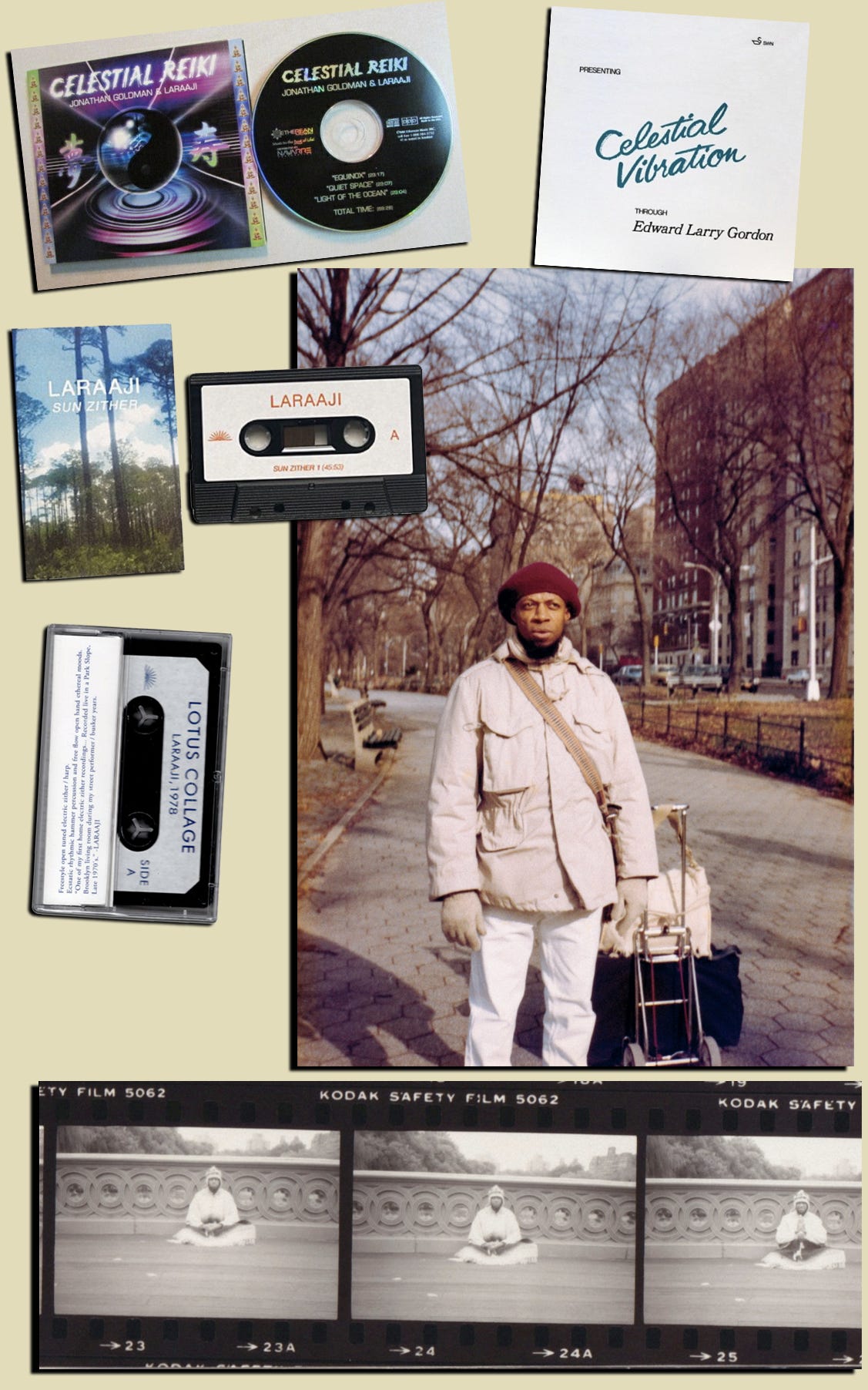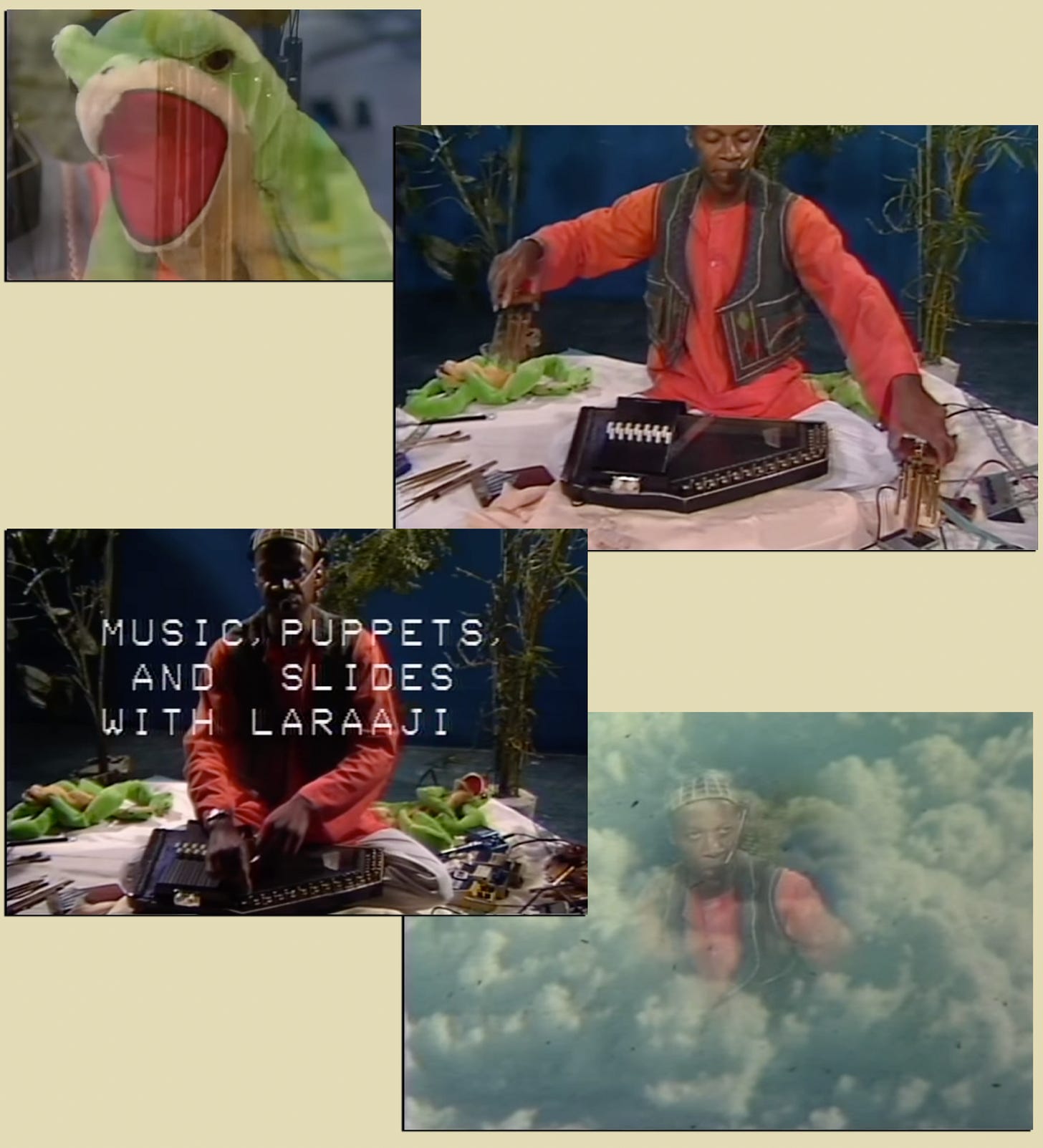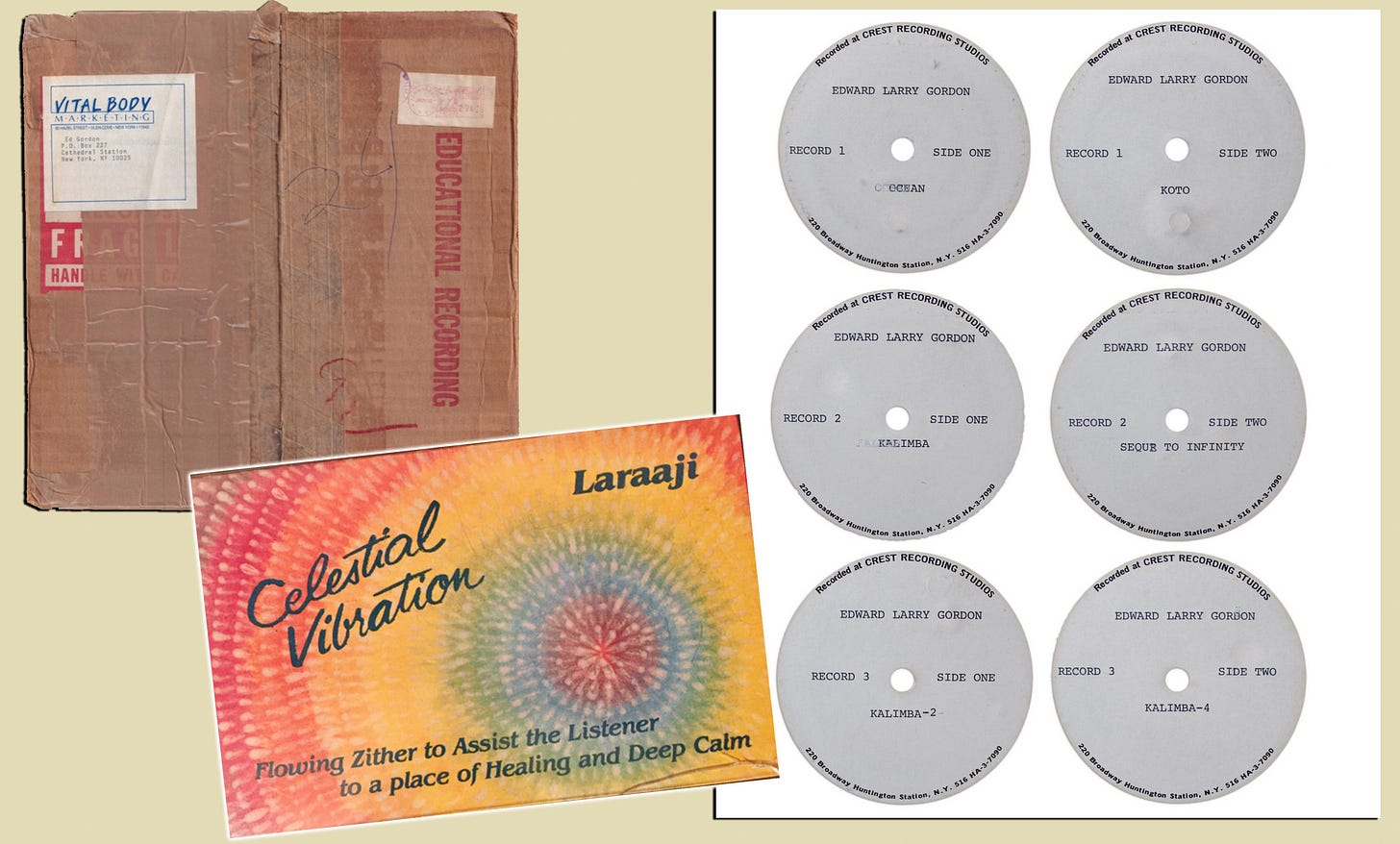Distract from your distractions: The Blackbird Spyplane Interview with Laraaji
The NYC New Age legend on the power of meditative shocks, rapporting with all-pervading energy fields, excellent newly unearthed music & more
Welcome to Blackbird Spyplane. Our interviews with Nathan Fielder, Jerry Seinfeld, Tyler, The Creator, Emily Bode, Online Ceramics, André 3000, Matty Matheson, Lorde, John Mayer, Danielle Haim, Ebon Moss-Bachrach, The Kid Mero, Daniel Arnold, Thomas Mars from Phoenix, Phoebe Bridgers, Michael Stipe, Sandy Liang, Héctor Bellerín, John Wilson, Mike Mills, Ezra Koenig, Action Bronson, Seth Rogen and more are HERE.
— Jonah & Erin
The full archive of Concorde, our new spinoff for Cla$$ified Tier subscribers, is here.
Laraaji — he’s an underground NYC legend, and if you listened to his shimmering, swirling music every morning, your day would be 33.3% more wavier at least. Emerging daily into the world fresh from a nourishing immersion in his polyrhythmic zither chunes?? You would probably find yourself being kinder to loved ones; more readily recognizing your mother in the faces of all living things; doing alternate-nostril breathing without even thinking about it; breaking into spontaneous laughter at life’s impossible beauty; and maybe even having profound conversations with a cosmic frog called Dr. Love!!
Laraaji’s been making music — & embodying kindvibes — for decades now. After studying composition and piano at Howard University in the 1960s, he moved to Manhattan, began running various zithers through various electronic effects pedals, and playing his clanging, entrancing, virtuosic drones at street festivals and on corners for passersby. In 1979 his improvisations famously caught the ear of Brian Eno, who happened to walk past while Laraaji was playing on a blanket in Washington Square Park, gave him his card, and wound up producing his brilliant 1980 album Day of Radiance.
That album helped establish Laraaji as a leading light of ambient and new age music. We play it all the time, along with other albums, comps and collaborations like his debut LP, Celestial Vibration, Lotus Collage, Sun Zither, Celestial Reiki (with Jonathan Goldman), and Essence / Universe…
You can also find tons of great videos of him performing across the years, like this highly vibey 1986 episode of his old public-access-television series Celestrana, or this chilled out Boiler Room livestream from 2020, featuring several appearances from Laraaji’s longtime frog-puppet friend Dr. Love. Last year the Spyfriends at Online Ceramics put out a little capsule of Laraaji jawns, and in 2021 he played a show with Solange and Sampha for Grace Wales Bonner at St. Peter’s Church in midtown — because Grace correctly recognizes that Laraaji is a one-of-a-kind GOAT.
This Friday, February 10th, Laraaji will release Segue to Infinity, a box set consisting of a re-press of Celestial Vibration, plus six never-previously released songs he recorded way back when he still went by his birth name, Edward Larry Gordon. These recordings were lost for decades, and only recently resurfaced when someone happened to spot the acetate discs from the sessions for sale on eBay, copped them, and set the wheels in motion for a reissue. They are truly excellent and we’ve been playing them over & over.
The other day we hit Laraaji up at home in Harlem to talk about all-pervading cohesive energy fields, 10-session marijuana experiments, nemasu goga nasaba sa be Fa gochona kehhh, and more!
Blackbird Spyplane: You’re a deep and longtime appreciator of the sun, so I wanted to point out we’re sun-drying some persimmons in the window over my shoulder here at HQ right now — hoshigaki style.
Laraaji: “Persimmons! Yes!”
Blackbird Spyplane: They’ve also been bathing in the sounds of Segue to Infinity, which we’ve been playing a ton. The story behind this music is fascinating — it’s amazing that the recordings were lost for decades, then the forces of the universe expressed themselves via eBay and brought the music back to light.
Laraaji: “You could call it mystical synchronicity, or the divine orchestration of events and connections that must unfold according to some divine vision.”
Blackbird Spyplane: Your music complicates what a lot of people think about when they hear words like “ambient” or “new age.” Especially your earlier work, which can be so intense — uptempo, clamorous, sometimes dissonant to the point it sounds like it’s almost falling apart. It’s not music designed for people to doze off to. In the liner notes for Segue to Infinity you mention that your aim early on was often to “shock the consciousness” by using “abrupt, sudden, angular and non-musical sounds.” I like the idea of a meditative shock.
Laraaji: “Yes, that abruptness can jerk the awareness back into alignment, or jerk it away from distractions — distract from your distractions.”

Blackbird Spyplane: You used to set up & play on the streets of Manhattan in the 1970s. What kinds of reactions would you get from people?
Laraaji: “That period of my life was about making a living, but it was also about doing research into the impact of an artist in a semi-altered state transmitting music — what effect would it have on New Yorkers? I’d play in Central Park, sometimes outside the Museum of Natural History, sometimes the Village. And the effect was that people would stop and forget where they were going so busily, and they’d get involved in the music. Some people would be walking their dogs and the dog would come by and lick my face, because I was sitting in Lotus position with my zither on a carpet. Some people, if they were inclined, would sit in Lotus position on the sidewalk, too.
“But 90% of the people I played for, I actually didn’t get to see, because my eyes were closed.”
Blackbird Spyplane: You often play with your eyes closed. What are some of the things you see when you do that?
Laraaji: “Indians may call it Third Eye. I switch to a universal-energy-field vision, so I’m not playing so much for individual beings and bodies, but I am rapporting within a unified field, a sense of an all-pervading, cohesive energy field. And what happens is the audience gets the benefit of hearing me rapport with a timeless all-pervading presence, and it draws them into that spaciousness.
“Sometimes I will visualize blood moving through the stream, or a yogi sitting in front of me in deep meditation. I can switch to images of that nature, or I can just get to a field — sometimes I’ll see it as a color, gold or blue.”
Blackbird Spyplane: The answer to this might be a simple no, but have psychedelics and other drugs ever played a role in your explorations?
Laraaji: “The answer is not a simple no. Ha ha ha ha! Yes. When I was in college at Howard, some roommates from New York who were pretty streetwise tried to turn me on to marijuana. I took one or two hits, and they were giggling at me because I said, ‘I don’t feel anything,’ and they were saying, ‘You’re high and don’t know it.’
“That didn’t get me very interested, but when I moved to New York I did a 10-session experiment on myself, thinking, I’ll see where it goes, and if I get nothing out of it again, I’ll abandon it. I remember doing this lying down, looking out my apartment window in Harlem, and on the 5th or 6th session, there was another apartment across the courtyard with a Tropicana carton and another beverage sitting on the windowsill — I was staring at them, and they turned into two penguins doing a soft-shoe dance. Ha ha ha! So I said, ‘OK, here we go.’
“It was a party-assisting substance until I sat down to do music and noticed I’d get into the flow state sooner, and that when I closed my eyes, images would come and superimpose themselves over me, images of characters, and I’d sing their songs and sing their poetry. It was suddenly a whole new resource for musical inspiration.”
Blackbird Spyplane: No doubt…

Laraaji: “I was deliberately using music to uplift and inspire, and at the same time I was beginning my research into metaphysics, meditation, and energy work, and how to be mindful of positive states of consciousness — so that inclusion of cannabis with being conscious of good vibrations was a very good marriage.
“Along the way I tried hash. I tried LSD once, but wasn’t sure what it was supposed to do and I abandoned it. I don’t think I tried coke, because I didn’t like the idea of what it did to your nose. I tried ayahuasca, and that was a very powerful learning experience. And mushrooms, a couple times I had a very positive experience with them — they opened a field of sensitivity with nature. So I think there’s gold in those hills. Psychedelics hold a lot for us.”
Blackbird Spyplane: They decriminalized mushrooms here in Oakland not that long ago.
Laraaji: “I’ll be there soon! Ha ha. But not everyone uses psychedelics with the same intentions, so I’ve always held back from saying you should try it. I say, if your inner guidance points you in that direction, then trust your inner guidance and give it a shot.”
Blackbird Spyplane: You wear orange almost exclusively, because it reminds you of the color of the sun, because it has a connection for you with forces of creativity, and because you like the way it reflects sunlight. I’m wearing all black right now, and I wonder whether, on some level, I’m trying to soak up the sun — maybe I want to absorb it all, and reflect none. Maybe that’s what goths are doing, too, and they don’t even realize it.
Laraaji: “That’s uplifting for me to hear that, because black is the absorption of all color, and when I’ve asked other people why they wear black, it hasn’t been that radiant of an explanation.”
Blackbird Spyplane: Okay, I asked you to tell me about a special cherished possession, and you chose Dr. Love. This is one of two frog puppets you bought at a toy store in a mall in Florida in the 1980s —
Laraaji: “Yes, Dr. Love and Dr. Peace. It was difficult at first for me to think of something for this, because part of my practice is, ‘Hold on tightly, let go lightly’ — not being really attached to possessions. But… ” [pulls out Dr. Love]
Blackbird Spyplane: Oh what’s up Dr. Love!
Dr. Love: “Dayunga nemasu goga nasaba sa be Fa gochona kehhh.”
Laraaji: [Translating] “‘With infinite omnipresent delight I come through the one of us to the light.’ Dr. Love, Jonah is interviewing me.”
Dr. Love: “Dogo yehh ssiki yuuu niki dgosta michki waaa banande.’
Laraaji: [Translating] “Dr. Love is open to any questions you have.”
Blackbird Spyplane: Dr. Love, I’m gonna transcribe this conversation for the readers of Spy Nation, and I’ll have to do a phonetic transcription of what you say, so I’m afraid might get some things wrong.
Dr. Love: “Ehh diggi uwaa.”
Laraaji: “That should be very humorous, because the language will probably scramble the mind. The mind is looking for something to hold on to, and if it fails, it’ll fall back into zero-point field, which is what Dr. Love is trying to teach — haha! — to relax from the thinking mind to the language of the field, and so the person who thinks they’re an individual person, using their brain to process an individual identity, will be frustrated and just give up, and let the mind that is not thinking reveal the bigger time-space.
Dr. Love: “Day o don di inshi ingowa day shwoggonnaiiii.”
Blackbird Spyplane: Watching the two of you together, it reminds me of something kind and profound I might have watched on Sesame Street when I was little. What does Dr. Love help you to express in performances?
Laraaji: “Oh, Sesame Street is great. Dr. Love helps me to get into an area of myself that is currently timeless and eternal, to be in it, and feel it, and it relaxes me in such a way that I can come fresh into each moment, kind of interpreting what was said — you have to be in No Mind to get what it’s about, but when you attempt to interpret it for a linear-thinking mind, what comes up is some refreshing ideas.
“And what I’ve learned from working with audiences is that they find it humorous and relaxing and it draws them out of their local agenda. When I did television in New York in the ‘80s, sometimes I’d come in without Dr. Love and the producer would be disoriented — ‘Where’s Dr. Love?’ I was having fun, but I’d forget that other adults were having fun with me, too.”

Blackbird Spyplane: It’s wild that you’ve had this puppet for something like 40 years. It looks brand new.
Dr. Love: “Gogodack yeeno dahh”
Laraaji: “As new as the now. Dr. Love and Dr. Peace have both remained vibrant. I’ve had them mended, because I was guided to befriend a woman on the Upper West Side who repairs sailboat sails, and she fixed some holes they developed. I also do things to protect them, like when I’m working with children, and someone asks, Can my son play with Dr. Love? Nope! They might have candy on their hands. I safeguard Dr. Love so he’s not inadvertently abused.”
Blackbird Spyplane: There can be all kinds of unintended destructive side effects to a child’s love. To anyone’s love, really.
Laraaji: “It’s true. And I haven’t ever come across these same puppets for sale again, so I feel inclined to protect them.”
Laraaji’s Segue to Infinity is truly fantastic, and it’s available on vinyl, and digitally, here. He’s on Instagram here, and there’s a Bandcamp page for past releases on the Numero Group here and on the Leaving Records label, here.







Wow my morning is infinitely wavier
Activating defcon 5 on my wallet if the full collection of Celestrana episodes is ever released physically 🌊🌊🌊 The ones online are so so good